The number illusion is a logical fallacy of sorts, an appeal to the authority of what looks like objectivity. You can’t argue with math. While that’s true, in social sciences there is the continued absence of real proofs which dominate the hard sciences. Newtonian physics works as a worldview because the numbers throughout history have always checked out.
When an Economist uses numbers, you have to check out all the assumptions behind them – because there are so many. It is a form of scientism whose real purpose is meant to discourage such questions and questioning.
And Economics is hardly alone with this preoccupation. Long before Positive Economics came on the scene in the middle of the last century the Communists were running around extolling the virtues of their political “science” which calculated what they claimed would be the optimal way to govern (by death and punishment, if needed; all the numbers said so).
The Chinese like the Russians have favored this scientism. As you might surmise, it doesn’t always work perfectly (if at all). Modern China is, at its root, recognizing the genocidal follies of Maoism and owning up to them (in economic terms; not so much the death-y parts). Deng Xiaoping rose as Mao’s temporary replacement in the seventies, wondered what to do in response throughout the eighties, and then watched in horror as his Soviet comrades to the north dissolved into historical nothingness in the early nineties.
As Deng once said, “In building socialism we have had both positive and negative experience, and they are equally useful to us.” What that had meant in 1992 was going all-in on the attempt to apply capitalist practices in order to save Chinese Socialism.
Deng’s reactionary rival Chen Yun had famously called this the “bird cage economy.”
The market system should be caged by Maoist belief, else the bird would fly away. But the cage also shouldn’t be too small, lest the animal atrophy and suffocate.
Chen fought effectively for the smallest possible coop while Deng had figured out small would surely lead to Soviet-style annihilation. Deng eventually won the argument, and for the next two decades the Chinese Communists would ride a tidal wave of eurodollars they readily invited onto their shores to finance (and spur with new ideas) a very different outcome.
It worked.
When along came the first Global Financial Crisis (GFC) and with it the Great “Recession” of 2008-09, Deng’s successors at the time viewed it the same way as everyone else did. While the Developed Market (DM) economies of the West were stuck, pity them, with some “new normal” of low-level growth, China need only bide its time with textbook Keynesian “stimulus” in order to ride out its milder portion of the global contraction.
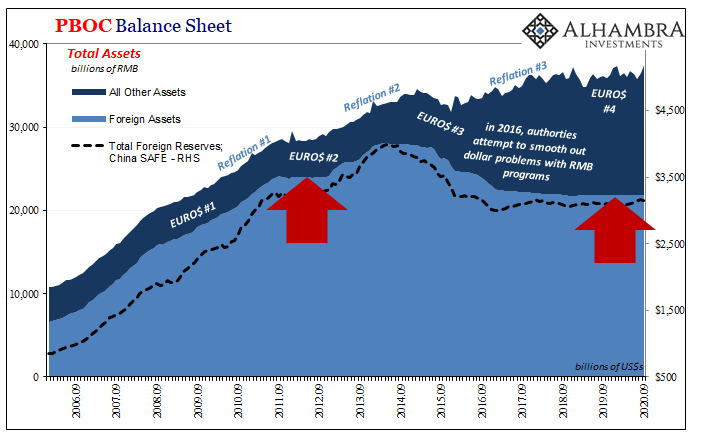
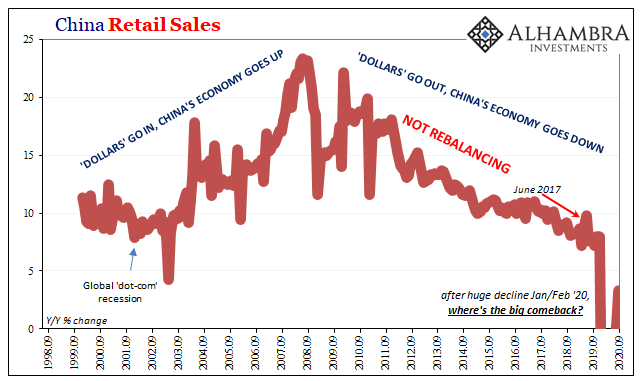
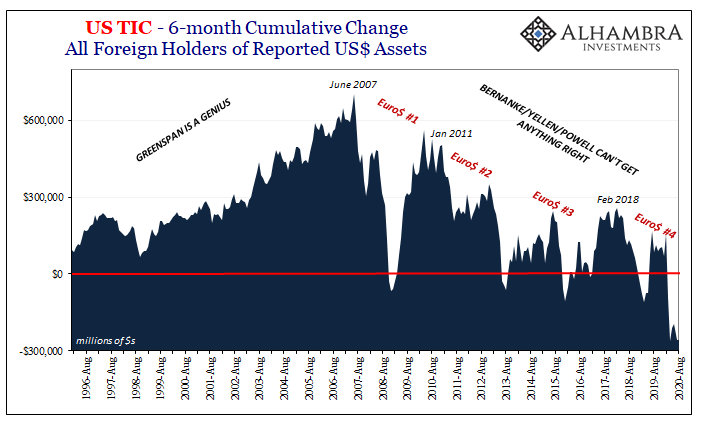
Business-as-usual was forecast as the inevitable end result of this broadly anticipated changing of the guard.
Over time, the country’s vast industrial capacities would be busied making goods to send to other places in Asia or Africa rather than Europe and the United States. The growth inside wouldn’t change, only the destination for all that steadied increase of production would. Emerging Market (EM) economies like China would rule the post-GFC1 world unchallenged – and the Chinese thought they had re-acquired the (euro)dollar stream to prove it (above).
But (“unexpected”) trouble mounted again in 2011. Growing worried, officials under Hu Jintao’s watchful gaze gave the (Keynes) textbook a second look – and a second try. More “stimulus” in 2012 to keep the internal economy going while everyone waited maybe a few more years; a little more public spending to tide them over in between.
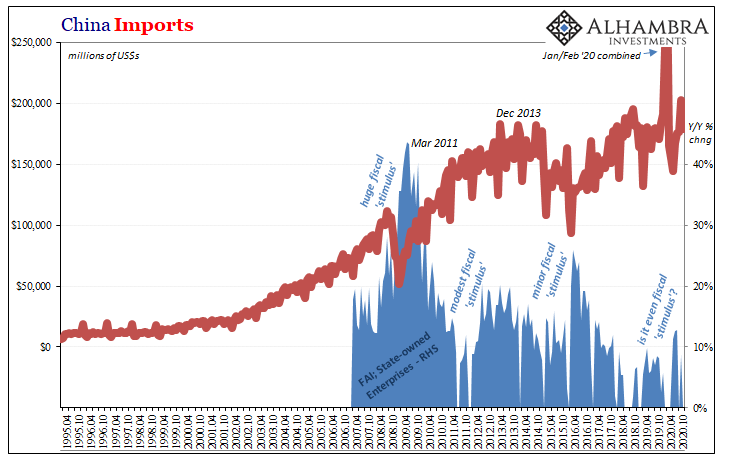
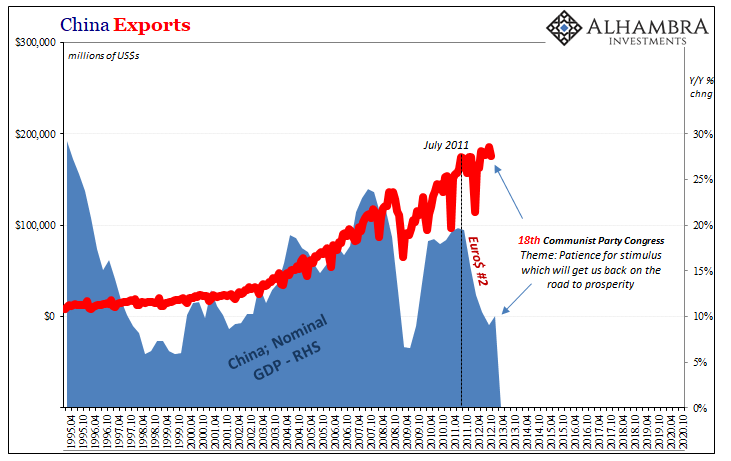
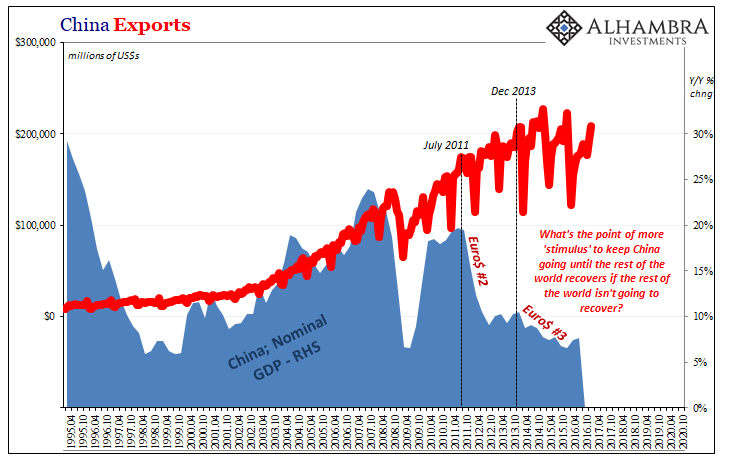
But instead, Euro$ #3 showed up and changed everything. Everything. Not only had Hu given way to Xi Jinping, already somewhat of a surprise, more to the point the anticipated external growth either EM or DM began to just disappear altogether. What had the 2012 “stimulus” packages actually achieved? For that matter, the much larger 2009 version?
Whether or not you agree with the man, you can understand Xi’s predicament. Expecting a temporary bridge to the same Chinese future Hu Jintao had bequeathed him, as Jiang Zemin had given Hu, Jiang taking over from Deng, Xi unlike Western Economists and central bankers couldn’t afford to keep waiting for the global “recovery” that was only ever one in the future sense.
Thus, having squandered so much on textbook “stimulus” waiting for the cavalry of global growth to arrive, by 2017 there was no going back. The way it had worked from Deng’s expanded bird cage view would have to be altered to this very different set of global economy circumstances.
Know dollars, know growth. No dollars, no growth.
While in the West there would be sustained celebrations and hysteria over an inflationary acceleration short on evidence in 2017, in China there began preparations for the exact opposite of those. Xi, not Janet Yellen, guessed correctly. Both had an abundance of numbers (bond market) showing them there really was only one way this could ever end up.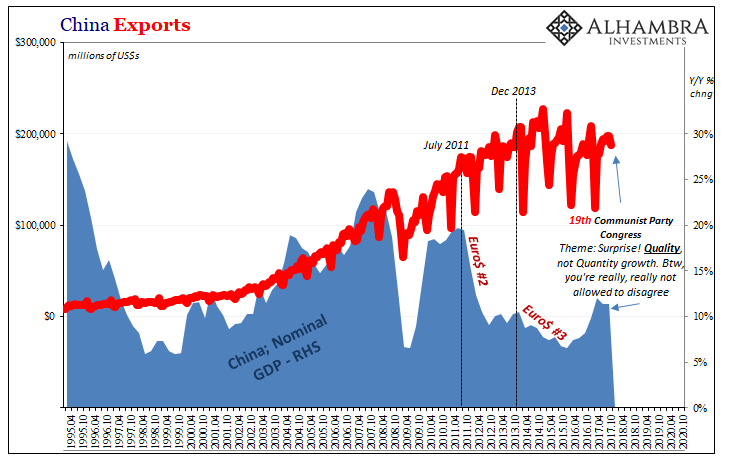
Ever since the 19th Party Congress in October 2017, Xi’s increasingly one-side Communism, technically called Xi Jinping Thought on Socialism with Chinese Characteristics, would mean a transition away from how China had operated going all the way back to Deng. This wasn’t some random selection, either, nor was it – as it may often seem – a naked power grab by Xi to make himself dictator.
Up until 2015, there was every reason to believe that Xi had remained in favor of Deng Xiaoping Theory – that is, until Euro$ #3 wrecked every last chance for a legitimate return to global growth.
Unlike Janet Yellen and Mario Draghi, Xi’s more calculated view has been validated by the three years since 2017’s Party affair. Yet again, Economists and central bankers in the West foundered on useless numbers produced by their assumed mathematics.
If anything has changed in China since the 19th, it is that this new way of doing things has become more defined over time. With that definition, obviously, more numbers. Just not those related to the quantity of economic growth.
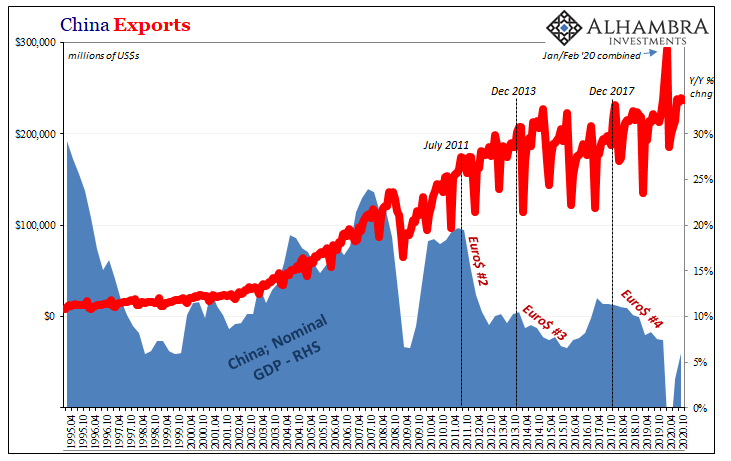
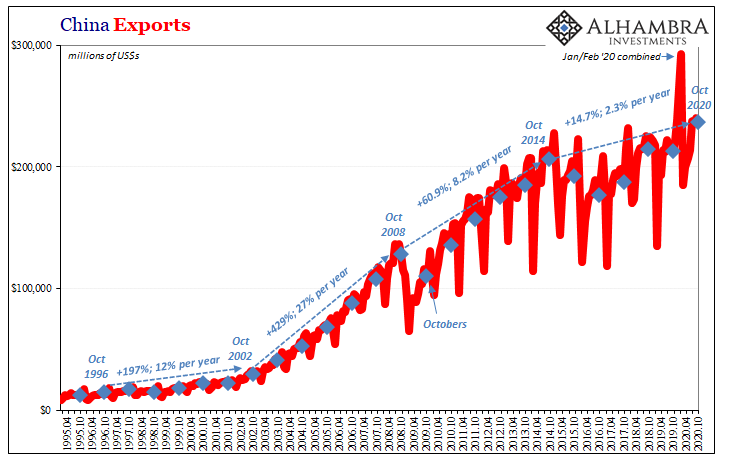
Instead, China’s Communist scientism has been reprioritized to what they’ve been calling “quality” growth. How do you get the Chinese people to accept a very, very different version of their economic future? By making it a “scientific” proposition, and one that’s being dictated for “everyone’s” benefit.
Not only is China preparing its 14th 5-year plan along those lines, a plan which is suddenly looking way ahead 15 years to 2035, the Communist government is also in the process of adding more detail to its 2020 policies of ensuring stability on the six fronts in order to safeguard security in the six areas.
Bureaucracies and their numbers, such objectivity in them is, for believers, quite reassuring. It’s SCIENCE!
The six fronts are: employment, finance, foreign trade, foreign investment, domestic investment, and market expectations. These are basic tools by which the wise, scientific Chinese Socialists studiously, steadfastly replacing Deng Xiaoping Theory with Xi Jinping Thought will guarantee China’s security in the six areas: employment, people’s livelihoods, the development of market entities, food and energy security, the stable operation of industrial and supply chains, and the smooth functioning of society.
These new numbers include a pretty stunning lack of rebound from what has happened in 2020. The rest of the world might be waiting for China to bail it out like it had in 2009 and 2012, even 2016 to an extent, but they’ll be waiting for nothing. In October 2020, Chinese exports were up 11% year-over-year, and that was the highest growth rate in two years, but like all the other rebound numbers it isn’t impressive in the slightest.
Instead, more validation for Xi’s thinking on the bird.
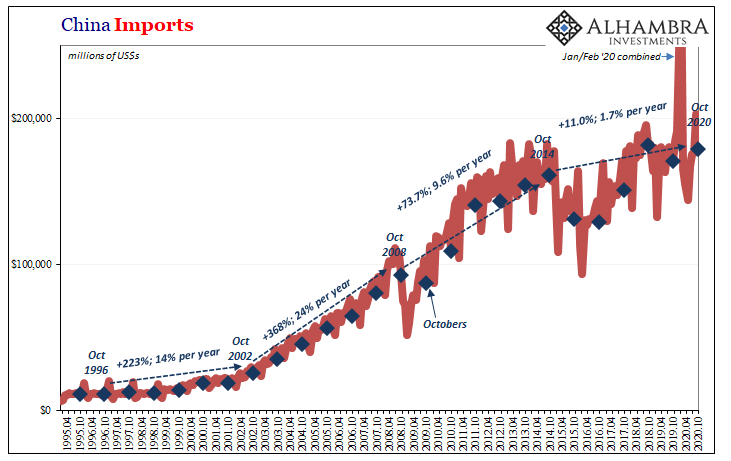
Imports into China last month increased just 4.7% from last October. More to the point, Chinese imports last month were all of 11% higher (total, not per year) than they had been in October…2014. Thus, the ongoing downgrade of the size of the bird’s cage.
In other words: the global situation changed many years ago and China’s Communists are and have been preparing China for the inevitable consequences. Just “trust us”, Xi says, it’s going to be just fine since we’ve got all the numbers worked out. The bird’s going to be put back into its smaller, more choking cage because the once-vibrant animal isn’t going anywhere anyway.
It quite clearly hasn’t any strength left.

Stay In Touch